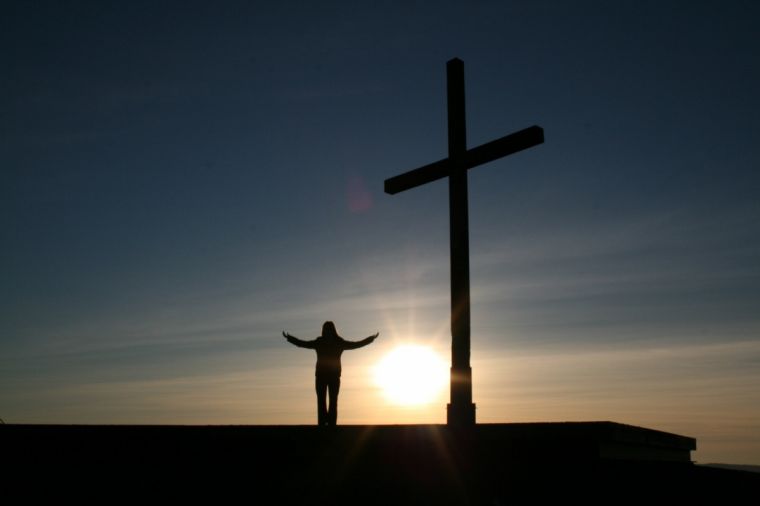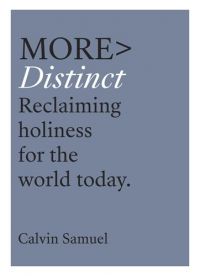True holiness: Why it's not about keeping the rules
This article is an extract from 'More Distinct: Reclaiming Holiness for the World Today' by Calvin Samuel, published yesterday.
In one of my favourite scenes in The Lion King, two hyenas are talking about the king of the jungle, Mufasa. For one of the hyenas, every time the name Mufasa is mentioned it sends a shiver down her spine. For many people, the word 'holiness' has the same effect; it has become something of a 'Mufasa' word.
You see, holiness has an image problem. In many quarters, it's a word which elicits negative connotations and legalistic impressions, too often conjuring ideas of 'holier than thou' and judgmental attitudes. Talk of holiness can easily make us feel inadequate, a measure of how far we've fallen short, a reminder of how much further we have to go.

Some years ago I was asked to lead a church weekend event on this very theme. A number of people came up to me and said, 'I've been dreading this weekend for months!' FYI, that's never something the person leading your church weekend wants to hear. But it wasn't me they were dreading (at least that's what they said). They were dreading three days of hearing how badly they had failed in the pursuit of holiness. There's something wrong with that picture, isn't there? If the gospel is good news, offering freedom, how is it that reflecting on holiness leaves some of us feeling trapped in a sense of inadequacy and failure? Why does this 'Mufasa' word send a shiver down the spine?
Something is wrong; and I believe it is that for many, we so easily and so often misunderstand what holiness is, what it is for, and how it is expressed.
The best description of holiness that I've discovered comes from a fabulous woman called Ruth Etchells. Dr Etchells was a former principal of St John's College, Durham University, and the only woman to have held this role in the college's 100-year history[...]. She describes holiness in this way: 'Holiness is actually the shining dazzle of profoundest divine love exchanged continually within the Trinity and poured out for creation in all its forms for our deepest and most joyful good.'
Three things strike me here. First, that holiness is a shining dazzle. Too few people are inclined to think of holiness as shiny. Most of us think of holiness as dour, hard work, sober and serious. Etchells reminds us that holiness is attractive.
Second, that holiness is rooted in divine love. This not only reminds us that holiness and love are necessarily linked, but also reminds us that holiness is the core of God's being. If holiness is rooted in divine love, and God is Love, then whenever we talk about holiness, we are in fact trying to describe that which is the very heart of God.
Third, holiness is rooted in divine action. Holiness is divine love poured out on creation. Who does the pouring out? God. Why is the love poured out? For our deepest and most joyful good. Holiness is rooted in the gracious action of God.

I grew up in a church that was very keen on holiness. It was emphasized, pursued, preached, taught and modelled; but it was not gracious. Instead it was judgmental and legalistic. I don't remember what I was taught about holiness, but I do know what I learned: holiness is a long list of rules and things that you don't do. In reality, this couldn't be further from the truth. You will never become holy because you work hard at it and keep all the rules[...].
Holiness is the product of God's grace. You are saved by grace; you are also sanctified by grace. We are holy when we reflect something of God's goodness and glory in the world; holiness is not so much about sinless perfection as it is about Christlike reflection. Moreover, holiness is for our deepest and most joyful good.
I grew up viewing holiness like the spoonful of cod liver oil that my parents made me and my siblings drink each day as a tonic for good health; it was good for us but tasted vile. But Dr Etchells' definition suggests that holiness is more like children's cough-and-cold syrup; it's both good for you and pleasant to the taste. Much like this sweet-tasting medicine, holiness will make us well; the path to human wholeness is by means of God's holiness.
If holiness is not (as many of us have too often thought!) primarily about prohibited behaviour and rather about positive action, it follows that holiness is transformational. However, transformation is only truly valuable to the church if it is also conformation to the image of Christ and to the mission of God. Therefore, to pursue holiness is to acknowledge that all is not well. Individuals, communities and the world need to be both transformed and conformed to the image of Christ.
In many ways, this is obvious. However, there are so many of us who do not really want to be transformed. We are who we are; we've spent a great deal of our time and energy figuring out who we are. In an age in which tolerance is the supreme virtue, the idea that anyone should tell someone else that he or she is in need of transformation feels a little uncomfortable. We may not mind a little spit and polish, but we don't really want to be transformed. The truth is you need to be transformed; we need to be transformed; our churches, good Lord, need to be transformed.
The problem with transformation is that challenges often have to be faced and sinfulness has to be acknowledged. To see the world by the light of the revelation and holiness of God is to have our vision corrected. It's like a visit to the opticians: when we are finally offered the right lens the world suddenly becomes clear. That is the primary positive action of holiness; it transforms[...].

If some earlier Christians had had their way there'd be no sex, gambling, alcohol, or sports on a Sunday. That vision of the world was rejected. Instead, when we understand holiness as positive action, as a reflection of Christ, holiness is deeply and powerfully attractive. I am not suggesting that holiness does not result in prohibited behaviours. I am suggesting that the transforming power of God will address those far more effectively than judgmental humans or a list of dos and don'ts...
Radical holiness is rooted in an optimism of grace; it is to believe that there are no boundaries in which God's goodness and glory may not be reflected. It is a way of seeing the world and all within in it as pregnant with the possibilities of grace despite its brokenness, sinfulness and dysfunction.
'More Distinct: Reclaiming Holiness for the World Today', by Calvin Samuel was published yesterday by IVP.
Rev Dr Calvin Samuel is a Methodist minister and principal of London School of Theology.











